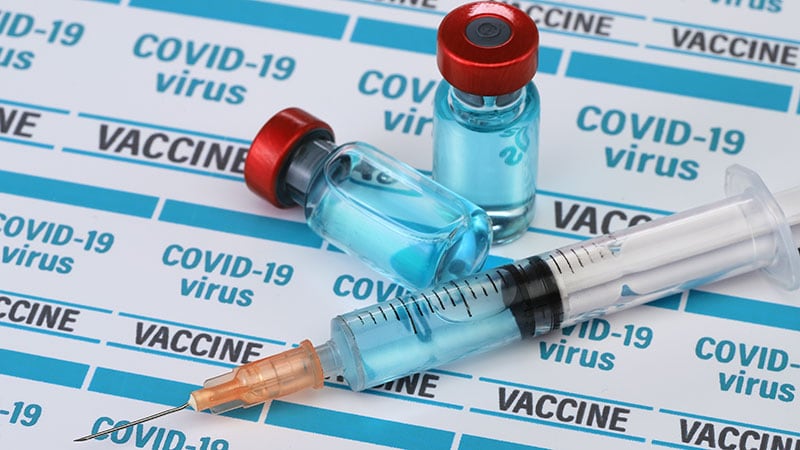[ad_1]
TOPLINE:
COVID-19 vaccination is associated with a reduced risk for hyperthyroidism in the initial months postimmunization, but it is associated with an increased risk for hypothyroidism over 12 months. The long-term risks for both are particularly higher in those who receive a single dose of messenger ribonucleic acid (mRNA) vaccines.
METHODOLOGY:
- COVID-19 vaccines have been fundamental in controlling the pandemic but concerns about potential adverse events following vaccination have sparked interest in understanding the effects of these vaccines on thyroid function.
- Researchers conducted a retrospective cohort study to investigate the potential effects of COVID-19 vaccination on thyroid function within 12 months postimmunization, using a subset of a database that includes 63 healthcare organizations in the United States.
- They included participants who received mRNA vaccines (BNT162b2 or mRNA-1273) or adenoviral vector vaccines (Ad26.COV2.S) from January 2022 to December 2023. Those who hadn’t received vaccinations were included in the control group.
- Propensity score matching was used to balance baseline characteristics, after which 1,166,748 vaccinated and 1,166,748 unvaccinated individuals (mean age, 43.7 years; 51.7% women; 61.7% White individuals) were included.
- Primary outcomes were diagnoses of subacute thyroiditis, hyperthyroidism, and hypothyroidism, assessed over a 12-month follow-up period.
TAKEAWAY:
- Individuals in the vaccinated group had a lower risk for hyperthyroidism at 3 months (hazard ratio [HR], 0.65; 95% CI, 0.58-0.73), 6 months (HR, 0.80; 95% CI, 0.73-0.87), and 9 months (HR, 0.89; 95% CI, 0.82-0.96), with the risk equalizing by 12 months between the vaccinated and unvaccinated groups. No significant difference in the risk for subacute thyroiditis was noted between the groups over the follow-up period.
- Hypothyroidism risk was higher in the vaccinated vs unvaccinated group at 6 months (HR, 1.14; 95% CI, 1.10-1.18), 9 months (HR, 1.21; 95% CI, 1.17-1.25), and 12 months (HR, 1.30; 95% CI, 1.27-1.34); however, the incidence at 12 months was approximately ≤ 1% in both the groups.
- Subgroup analysis revealed a higher risk for hypothyroidism over 12 months in individuals aged ≥ 65 years (HR, 1.40; 95% CI, 1.35-1.46), women (HR, 1.37; 95% CI, 1.33-1.41), and Asian individuals (HR, 1.43; 95% CI, 1.30-1.58) in the vaccinated group, with no between-group differences in the risk for subacute thyroiditis and hyperthyroidism across all subgroups.
- The risk for hyperthyroidism and hypothyroidism over 12 months was significantly higher in groups vaccinated with the mRNA vaccines than in the unvaccinated group, but no difference in the risk was noted in the group vaccinated with Ad26.COV2.S.
IN PRACTICE:
“This highlights the necessity for long-term monitoring of thyroid function in vaccinated individuals,” the authors wrote. “Healthcare providers should be aware of the potential increased risk of thyroid dysfunction in vaccinated patients and consider regular monitoring to ensure timely detection and management of thyroid-related issues,” they added.
SOURCE:
This study was led by Kai-Lun Cheng, School of Medicine, Chung Shan Medical University, in Taichung, Taiwan. It was published online in The Journal of Clinical Endocrinology & Metabolism.
LIMITATIONS:
This study did not exclude individuals who may have been infected with SARS-CoV-2 during the study period. The potential confounding effect of undiagnosed or asymptomatic SARS-CoV-2 infections could bias the results. This study’s findings may not be generalizable to other vaccine types, such as protein subunit or inactivated virus vaccines.
DISCLOSURES:
This study was funded by the Chung Shan Medical University Hospital Research Program. The authors reported no relevant conflicts of interest.
This article was created using several editorial tools, including AI, as part of the process. Human editors reviewed this content before publication.
[ad_2]
Source link : https://www.medscape.com/viewarticle/does-covid-19-vaccination-affect-thyroid-health-long-term-2025a100037c?src=rss
Author :
Publish date : 2025-02-10 06:08:45
Copyright for syndicated content belongs to the linked Source.
